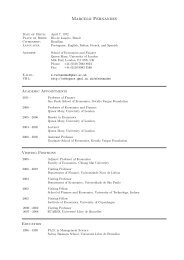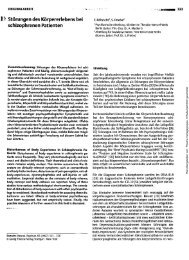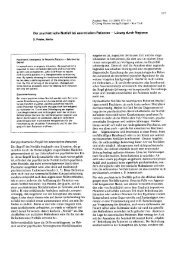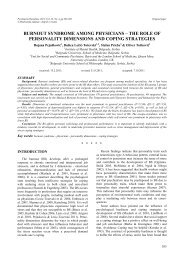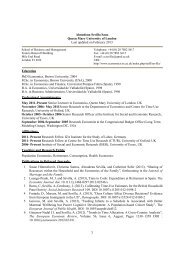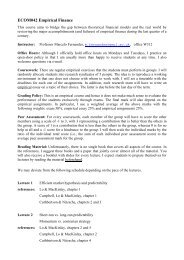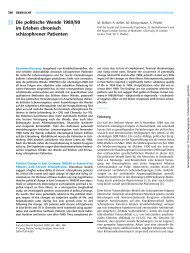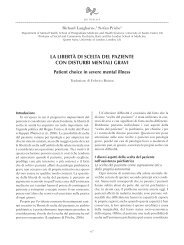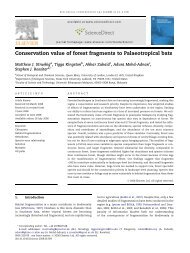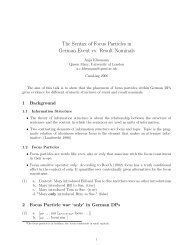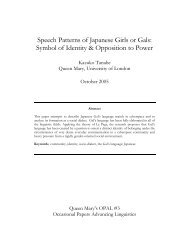Proofs - Personal Webspace for QMUL - Queen Mary, University of ...
Proofs - Personal Webspace for QMUL - Queen Mary, University of ...
Proofs - Personal Webspace for QMUL - Queen Mary, University of ...
Create successful ePaper yourself
Turn your PDF publications into a flip-book with our unique Google optimized e-Paper software.
Editorial<br />
© 2012 Elsevier Masson SAS. All rights reserved.<br />
European Psychiatry 27 (2012) / supplement n°2 / S1-S3<br />
Mental health in different groups <strong>of</strong> migrants<br />
and ethnic minority within Europe and beyond:<br />
Regional and cross- national challenges<br />
and approaches in research, practice and training<br />
A. Heinz a , U. Kluge a<br />
a Department <strong>of</strong> Psychiatry & Psychotherapy, Charité Berlin, Germany<br />
Mental health and migration are two issues <strong>of</strong> increasing<br />
importance <strong>for</strong> health care systems and services regarding<br />
prevention, promotion and the quality <strong>of</strong> delivery <strong>of</strong> care.<br />
Immigration and emigration are as old as mankind, however,<br />
new <strong>for</strong>ms <strong>of</strong> mobility [5,10], the effects and consequences <strong>of</strong><br />
war and demographic changes (to name just a few) created a new<br />
quality <strong>of</strong> migration in recent years that affects European health<br />
care systems and services. A great variety <strong>of</strong> lifestyles, everyday<br />
realities and diverse cultural repertoires are interwoven and<br />
compete with each other. Migratory milieus and cross- cultural<br />
relationships create new spaces, in which individuals from different<br />
cultural backgrounds experience diversity and develop<br />
their identity and their conception <strong>of</strong> the self and their environment.<br />
The so called globalisation creates new challenges and<br />
demands and promotes new competences [24] – also in the<br />
health sector [20].<br />
The number <strong>of</strong> migrants in the world has more than doubled<br />
since 1975, with most migrants living in Europe (56 million), Asia<br />
(50 million) and Northern America (41 millions) [8].<br />
In Europe, approximately 27% <strong>of</strong> the population between<br />
18 and 65 years <strong>of</strong> age are affected by at least one mental disorder,<br />
and roughly a quarter <strong>of</strong> these individuals are in treatment [23].<br />
Mental disorders belong to the group <strong>of</strong> diseases with the highest<br />
proportion <strong>of</strong> “Disability Adjusted Life Years” (DAYLs), as demonstrated<br />
by the Global Burden <strong>of</strong> Disease Study conducted by<br />
the WHO [25]. The economic burden caused by mental diseases<br />
<strong>Pro<strong>of</strong>s</strong><br />
68767<br />
EUROPEAN<br />
PSYCHIATRY<br />
THE JOURNAL OF THE EUROPEAN PSYCHIATRIC ASSOCIATION<br />
ISSN 0924-9338<br />
June 2012<br />
Vol. 27 - Supplement n°2<br />
pp. S1-S81<br />
Migration<br />
and Mental Health<br />
S1 Editorial<br />
A. Heinz, U. Kluge<br />
S4 The willingness to participate in health research<br />
studies <strong>of</strong> individuals with Turkish migration<br />
backgrounds: barriers and resources.<br />
A qualitative analysis <strong>of</strong> focus groups<br />
D. Dingoyan, H. Schulz, M. Mösko<br />
S10 Socio-economic status and emotional distress<br />
<strong>of</strong> female Turkish immigrants and native<br />
German women living in Berlin<br />
MC. Aichberger, Z. Bromand, A. Heredia<br />
Montesinos, S. Temur-Erman, A. Mundt, A.<br />
Heinz, MA. Rapp, M. Schouler-Ocak<br />
S17 Mental health <strong>of</strong> Turkish woman in Germany:<br />
resilience and risk factors<br />
Z. Bromand, S. Temur-Erman, R. Yesil,<br />
A. Heredia Montesinos, MC. Aichberger,<br />
D. Kleiber, M. Schouler-Ocak, A. Heinz,<br />
MC. Kastrup, MA. Rapp<br />
S22 The infl uence <strong>of</strong> stigma on depression, overall<br />
psychological distress, and somatization<br />
among female Turkish migrants<br />
A. Heredia Montesinos, MA. Rapp, S. Temur-<br />
Erman, A. Heinz, U. Hegerl, M. Schouler-Ocak<br />
S27 Translation and adaptation <strong>of</strong> the Zung<br />
Self-Rating Depression Scale <strong>for</strong> application<br />
in the bilingual Azerbaijani population<br />
F. Mammadova, M. Sultanov, A. Hajiyeva,<br />
M. Aichberger, A. Heinz<br />
S32 Construction and interpretation <strong>of</strong> self-related<br />
function and dysfunction in Intercultural<br />
Psychiatry<br />
A. Heinz, F. Bermpohl, M. Frank<br />
S44 Explanatory models and concepts <strong>of</strong> West<br />
African Malian patients with psychotic<br />
Symptoms<br />
F. Napo, A. Heinz, A. Auckenthaler<br />
S50 How to express mental health problems:<br />
turkish immigrants in Berlin compared to native<br />
Germans in Berlin and Turks in Istanbul<br />
A. Vardar, U. Kluge, S. Penka<br />
S56 Health services and the treatment <strong>of</strong><br />
immigrants: data on service use, interpreting<br />
services and immigrant staff members<br />
in services across Europe<br />
U. Kluge, M. Bogic, W. Devillé, T. Greacen,<br />
M. Dauvrin, S. Dias, A. Gaddini, NK. Jensen,<br />
E. Ioannidi-Kapolou, R. Mertaniemi,<br />
R. Puipcinós i Riera, S. Sandhu, A. Sarvary,<br />
JFF. Soares, M. Stankunas, C. Straßmayr,<br />
M. Welbel, A. Heinz, S. Priebe<br />
S63 The German concept <strong>of</strong> “intercultural opening”<br />
as an answer to challenges <strong>of</strong> migration<br />
- the development <strong>of</strong> an assessment tool<br />
<strong>for</strong> the appraisal <strong>of</strong> its current implementation<br />
in the mental health care system<br />
S. Penka, U. Kluge, A. Vardar, T. Borde,<br />
D. Ingleby<br />
S 70 Cross-cultural training in mental health care<br />
– challenges and experiences from Sweden<br />
and Germany<br />
S. Bäärnhielm, M. Mösko<br />
S75 Teaching psychiatry and establishing<br />
psychosocial services – lessons<br />
from Afghanistan<br />
I. Missmahl, U. Kluge, Z. Bromand, A. Heinz<br />
S80 Afterword<br />
A. Kleinman<br />
is the highest compared with other diseases [3]. Nevertheless,<br />
migrants and people suffering from mental health problems are<br />
among those subjects who experience the strongest barriers to<br />
access the health care systems in Europe [7] and the opening <strong>of</strong><br />
mental health care institutions to migrants remains a widely<br />
neglected topic.<br />
Barriers preventing migrants to access the health care<br />
system are <strong>of</strong>ten attributed to cultural differences and misunderstandings.<br />
However, “culture” is a multifaceted term that<br />
is <strong>of</strong>ten (mis- )used as a putative politically correct expression<br />
<strong>of</strong> “ethnical differences”, thus reifying social differences and<br />
neglecting discrimination. Misinterpretation <strong>of</strong> social differences<br />
as cultural can there<strong>for</strong>e result in inappropriate culturalisation<br />
and lead to new stigmatisation and exclusion. On the<br />
other hand, clinical practice is <strong>of</strong>ten characterized by a lack <strong>of</strong><br />
basic provisions to cope with cultural and social diversity, as<br />
indicated e.g. by the failure to provide translators in clinical<br />
settings. There<strong>for</strong>e, we would like to emphasize that our use<br />
<strong>of</strong> the term “culture” does not refer to a homogenous, “ethnic”<br />
category but rather to diverse aspects <strong>of</strong> a web <strong>of</strong> meanings that<br />
embeds people in various contexts [9]. Individuals develop as<br />
well as participate in diverse systems that order the available<br />
knowledge and actions with meaning. Culture is thus constituted<br />
by actions in the social and physical world and can be<br />
named as just one aspect <strong>of</strong> differentiation besides historical,<br />
social and economical features.<br />
01_Edito.indd S1 14/06/2012 14:48:47



